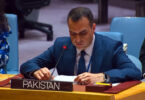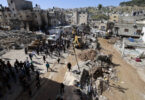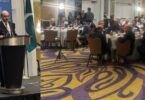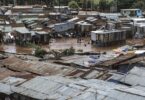Monitoring Desk
PHILADELPHIA: The words of the adhan, the Islamic call to prayer, are identical wherever it is sung, in every country where Muslims worship.
“Hayya ‘alas salah” is sung around the globe five times a day, including outside a construction trailer parked in a remote lot at Philadelphia International Airport by a city taxi driver, Sylla Salif. “Hayya ‘alas salah.”
Taxi strike threatened if airport closes parking lot. Drivers’ mosque at risk.
“Come to prayer. Come to prayer.”
As Salif sang last week, men washed their hands in streams of water from spigots, as is the Muslim custom to prepare for prayer. Some wore kufis on their heads, and a few dressed in long robes, either brightly colored or white. They climbed a few steps onto a wooden deck and put their shoes on shelves just outside the doors. Then about 30 filed in and knelt.
Salif, an immigrant from Ivory Coast in West Africa, said he holds no particular position of religious authority.
“Any Muslim would know how to call for prayer,” he said.
The mosque on Island Avenue is a humble monument to the efforts of cab drivers, the vast majority of them men, who sought to create a place of spiritual refuge amid the most prosaic of surroundings, a crumbling slab of asphalt where they park while waiting for fares from arriving flights.
The mosque had been threatened by the airport’s plans to displace taxis from that parking lot, one of two reserved for them, on May 1. The airport planned to use the lot for its own vehicles. About 300 of the city’s cab drivers rely on the airport almost exclusively for work, and losing those parking spots would have made it harder to be on the scene when potential fares arrive.
The drivers voted Tuesday to authorize a strike. Airport management relented the next day. A spokesperson said the airport wouldn’t move the cabs next month and would seek to accommodate the mosque in whatever parking arrangements eventually are made.
While the airport’s management was aware of the existence of the trailer used as a mosque, it did not grant official permission for it to be there, or for drivers to route water there from a nearby hydrant, a spokeswoman siaid.
Islam does not require that daily prayers be conducted in a group, but there is spiritual value in gathering, drivers said.
“If you pray with the group, you get more rewards than if you pray by yourself,” said Amadou Diallo, 52, who came to the United States almost 20 years ago from Guinea, also in West Africa. “When you get together, you’re going to love each other. If somebody needed help, you’re going to help each other.”
About half of Philadelphia’s 1,500 cab drivers practice Islam, said Ron Blount, a leader of a taxi labor group in the city. For most of the 20 years taxis have been parking on the Island Avenue lot, there has been some form of organized worship there. Initially, drivers knelt together on the ground. Then they brought in a tent, but in winter, weather and wind inevitably damaged it. It took three years of collecting donations from drivers to raise the $10,000 to buy the used trailer found in Allentown. The drivers carpeted it and have been using it for about two years.
Denomination isn’t important there, drivers said. Sunni and Shi’a alike are welcome. Uber and Lyft drivers who practice Islam are welcome. There is no imam. Drivers take turns leading the daily prayers.
“Asia, Africa, American, European,” said Alseny Diallo, an Uber driver who emigrated from Liberia. “There’s no country I don’t see here. Everybody is here.”
Philadelphia’s cab drivers had very different lives in the countries they came from. Among their number are doctors and engineers, Amadou Diallo said. They focused their talents on building a welcoming place. One driver with a knack for carpentry volunteered his time to build the wooden deck alongside the trailer.
The running water is another innovation by drivers. A garden hose linked to a fire hydrant brings water into storage tanks, and a pump in a barrel channels the water to the washing spigots. A small blue box inside the mosque holds donations. It costs $1,000 to $2,000 a year to maintain and clean the space.
The sense of pride in the structure, and the community it helps create, is evident when drivers discuss the work that went into it. A complaint among drivers of every denomination is that the lot’s portable toilets don’t include plumbing. The Muslim drivers see their place of worship as a gift to every cabbie who relies on the airport for income.
Taxi driver Kazi S. Ullah performs wudu, the ritual washing for purification before prayer, as the dhuhr (midday) prayer time begins at the makeshift mosque in the waiting lot for airport taxi drivers on Island Avenue in Philadelphia. Drivers paid for and built the washing station themselves.
Taxi driver Kazi S. Ullah performs wudu, the ritual washing for purification before prayer, as the dhuhr (midday) prayer time begins at the makeshift mosque in the waiting lot for airport taxi drivers on Island Avenue in Philadelphia. Drivers paid for and built the washing station themselves.
“The water is available for everybody, not just Muslims,” Amadou Diallo said. “This we did from our hearts to help our fellow drivers.”
A number of drivers were understanding about the threat of losing the mosque, saying the land is the airport’s and the it has the right to ask that it be removed. Knowing it can stay, though, is a relief.
“It’s wonderful to have that,” said Amadou Balde, also from Guinea. “It’s good to have a place to worship because we are commanded to do this, no matter how.”
Courtesy: (philly.com)






